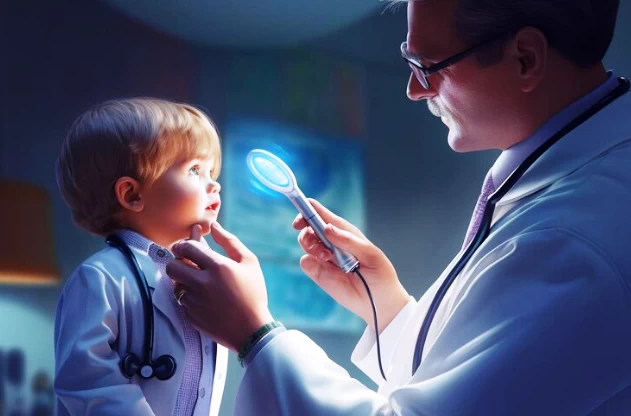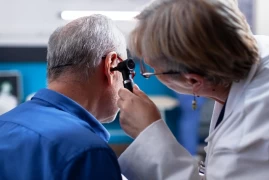
Tonsil and Adenoid Problems in Children
- Tonsil and Adenoid Problems in Children
- Tonsil and Adenoid Problems in Childhood
- What Are Tonsils and Adenoids?
- What Are the Symptoms of Tonsil and Adenoid Problems in Children?
- What Causes Tonsil and Adenoid Problems in Children?
- When Are Tonsil and Adenoid Surgeries Necessary in Children?
- Diagnosis of Tonsil and Adenoid Problems in Children
- Treatment Options for Tonsil and Adenoid Problems in Children
- Contraindications for Tonsil and Adenoid Surgeries in Children
- In conclusion,
Tonsil and adenoid problems in children are quite common health issues. In this article, I will provide a general overview of tonsil and adenoid problems in children, including their symptoms, causes, diagnostic methods, and treatment options.
Tonsil and Adenoid Problems in Childhood
Tonsil and adenoid problems in childhood are significant health issues that many parents encounter.
What Are Tonsils and Adenoids?
First, it is useful to describe tonsils and adenoids. Tonsils and adenoids are lymphatic tissue structures that are part of a child's respiratory and digestive systems. Tonsils are described as small, lump-like structures located at the back of the throat, while adenoids are situated at the back of the nose. Both structures serve to protect the body against infections.
What Are the Symptoms of Tonsil and Adenoid Problems in Children?
The symptoms of tonsil and adenoid problems in children may include:
- Sore throat
- Difficulty swallowing
- Frequent recurrent throat infections
- Earaches
- Nasal congestion or discharge
- Snoring or difficulty breathing during sleep
- Bad breath
- Loss of appetite
- Swollen neck lymph nodes
What Causes Tonsil and Adenoid Problems in Children?
Factors that can cause tonsil and adenoid problems in children include:
- Infections: Tonsils and adenoids can be exposed to bacterial or viral infections, leading to swelling and inflammation.
- Growth Issues: In some children, tonsils or adenoids may be larger than normal, causing breathing problems.
- Allergies: Allergic reactions can lead to swelling of tonsils and adenoids.
- Secondary Infections: Frequent recurrent throat infections can result in constant inflammation of tonsils and adenoids.

When Are Tonsil and Adenoid Surgeries Necessary in Children?
Tonsil and adenoid surgeries may be necessary in children under the following circumstances:
- Frequent and Severe Tonsillitis: If a child's tonsils are constantly inflamed and do not improve with antibiotic treatment, tonsil surgery may be considered. Frequent recurrent tonsillitis can lead to symptoms such as difficulty swallowing, high fever, and sore throat, making surgery necessary.
- Obstructive Sleep Apnea: Enlarged adenoids can obstruct a child's airways during sleep, leading to sleep apnea. In such cases, adenoid surgery may be considered. Sleep apnea can cause symptoms like nighttime snoring, interrupted breathing during sleep, excessive daytime sleepiness, and behavioral problems.
- Frequent Ear Infections: The enlargement of tonsils or adenoids can block the Eustachian tubes, leading to frequent ear infections or hearing loss. If a child experiences frequent ear infections or hearing problems, tonsil or adenoid surgery may be required.
- Breathing Problems: Enlarged tonsils or adenoids can obstruct a child's normal breathing. In such cases, surgery can correct respiratory problems.
- Bad Breath and Other Symptoms: Chronic bad breath, difficulty swallowing, or a persistent unpleasant taste in the mouth can indicate tonsil or adenoid problems. If these symptoms cannot be resolved through treatment, surgery may be considered.
Tonsil and adenoid surgeries in children are typically performed under general anesthesia. The post-operative recovery period is essential, and parents should follow the doctor's recommended instructions carefully. In any case, the necessity and timing of the surgery should be determined based on the child's specific condition. Therefore, it is important to consult with a pediatrician or an ear, nose, and throat specialist to evaluate your child's health problems and determine whether surgery is necessary.
Diagnosis of Tonsil and Adenoid Problems in Children
The diagnosis of tonsil and adenoid problems in children is typically made by an Ear, Nose, and Throat (ENT) specialist. Diagnosis usually begins with a physical examination and an assessment of the symptoms. If necessary, the doctor may perform additional tests:
- Blood Tests: Blood tests can be conducted to assess signs of infection.
- Imaging: X-rays or MRI scans may be required to get a better view of tonsil and adenoid problems.
Treatment Options for Tonsil and Adenoid Problems in Children
Treatment options for tonsil and adenoid problems in children can vary depending on the severity of symptoms and their underlying causes. Here are common treatment methods:
- Antibiotics: Bacterial infections can be treated with appropriate antibiotics.
- Surgery: Surgical intervention may be necessary for children with frequent recurrent throat infections or growth issues of tonsils and adenoids. Procedures such as tonsillectomy (tonsil removal) or adenoidectomy (adenoid removal) may be performed.
- Allergy Treatment: If allergies are causing tonsil and adenoid problems, allergy treatment may be recommended.
- Symptomatic Treatment: Pain relievers, decongestants, and other medications may be used to alleviate symptoms.
Contraindications for Tonsil and Adenoid Surgeries in Children
There are situations in which tonsil and adenoid surgeries are contraindicated, meaning they are not suitable. These contraindications should be considered based on the child's health and associated risks. Here are some examples of contraindications for these surgeries:
- Severe Health Problems: If a child has serious medical issues, surgery may carry higher risks. Conditions such as severe heart diseases, bleeding disorders, or respiratory problems can make surgery contraindicated.
- Chronic Diseases: Certain chronic health conditions can increase the risk of surgery. Conditions like diabetes or immune system disorders can be risk factors for surgery.
- Medication Usage: Some medications can affect surgery or increase the risk of complications. Particularly, blood-thinning medications should be carefully assessed before surgery.
- Allergies and Sensitivities: If a child has severe allergies or sensitivities to anesthesia or surgical materials, careful management is necessary before and after surgery.
- Inadequate Indications for Surgery: If there is insufficient medical justification for surgery or if symptoms are very mild, surgery may be contraindicated. Tonsil or adenoid surgeries are necessary to improve specific symptoms or health problems.
- Age Factor: In some cases, surgery may carry higher risks based on the child's age. Particularly, very young children may have increased surgical risks.
- Family History: Family history can influence the decision to perform surgery. For example, if there are family members who experienced complications after similar surgeries, a more careful assessment is necessary.
Every child is unique, and the necessity or contraindications of surgery should be evaluated based on the child's specific condition. Therefore, it is important to consult with a pediatrician or an ear, nose, and throat specialist to determine whether tonsil and adenoid surgery is necessary and appropriate. These specialists have the knowledge to make the best decision based on the child's medical history, symptoms, and overall health.
In conclusion,
Tonsil and adenoid problems in children can be successfully managed with the right diagnosis and treatment. Parents should closely monitor their child's symptoms and seek the advice of an Ear, Nose, and Throat specialist. By following the healthcare professional's recommendations, the child's health and comfort can be optimized.






